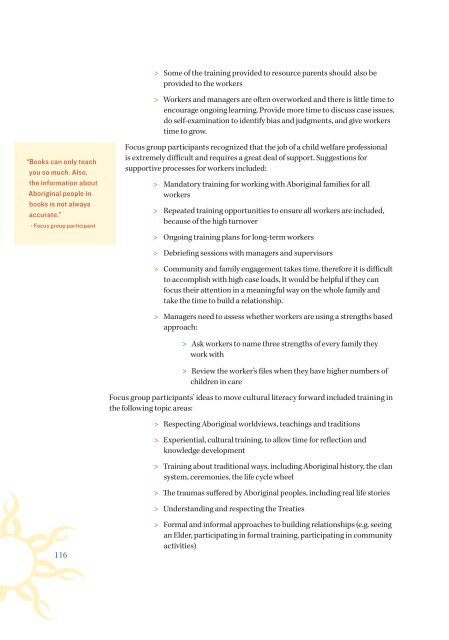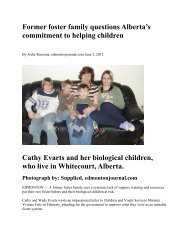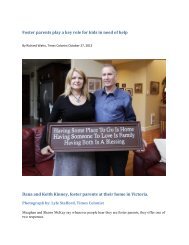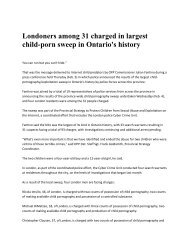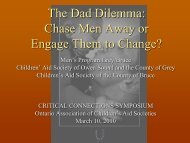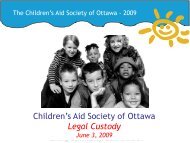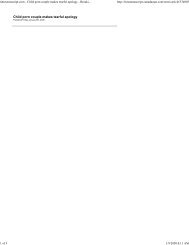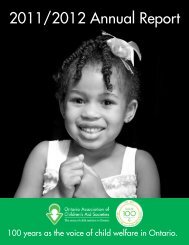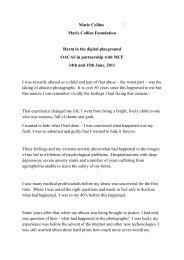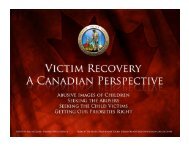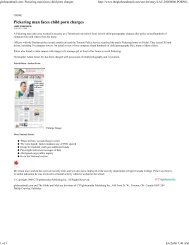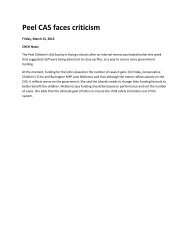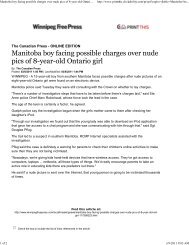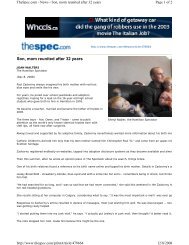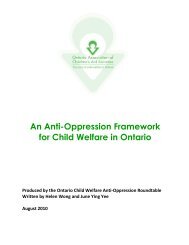English - Ontario Association of Children's Aid Societies
English - Ontario Association of Children's Aid Societies
English - Ontario Association of Children's Aid Societies
You also want an ePaper? Increase the reach of your titles
YUMPU automatically turns print PDFs into web optimized ePapers that Google loves.
Some <strong>of</strong> the training provided to resource parents should also be<br />
provided to the workers<br />
> > Workers and managers are <strong>of</strong>ten overworked and there is little time to<br />
encourage ongoing learning. Provide more time to discuss case issues,<br />
do self-examination to identify bias and judgments, and give workers<br />
time to grow.<br />
“Books can only teach<br />
you so much. Also,<br />
the information about<br />
Aboriginal people in<br />
books is not always<br />
accurate.”<br />
- Focus group participant<br />
Focus group participants recognized that the job <strong>of</strong> a child welfare pr<strong>of</strong>essional<br />
is extremely difficult and requires a great deal <strong>of</strong> support. Suggestions for<br />
supportive processes for workers included:<br />
> > Mandatory training for working with Aboriginal families for all<br />
workers<br />
> > Repeated training opportunities to ensure all workers are included,<br />
because <strong>of</strong> the high turnover<br />
> > Ongoing training plans for long-term workers<br />
> > Debriefing sessions with managers and supervisors<br />
> > Community and family engagement takes time, therefore it is difficult<br />
to accomplish with high case loads. It would be helpful if they can<br />
focus their attention in a meaningful way on the whole family and<br />
take the time to build a relationship.<br />
> > Managers need to assess whether workers are using a strengths based<br />
approach:<br />
> Ask workers to name three strengths <strong>of</strong> every family they<br />
work with<br />
> Review the worker’s files when they have higher numbers <strong>of</strong><br />
children in care<br />
Focus group participants’ ideas to move cultural literacy forward included training in<br />
the following topic areas:<br />
> > Respecting Aboriginal worldviews, teachings and traditions<br />
> > Experiential, cultural training, to allow time for reflection and<br />
knowledge development<br />
> > Training about traditional ways, including Aboriginal history, the clan<br />
system, ceremonies, the life cycle wheel<br />
> > The traumas suffered by Aboriginal peoples, including real life stories<br />
> > Understanding and respecting the Treaties<br />
116<br />
> > Formal and informal approaches to building relationships (e.g. seeing<br />
an Elder, participating in formal training, participating in community<br />
activities)


